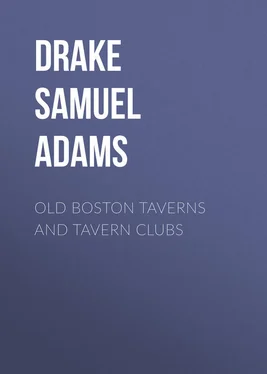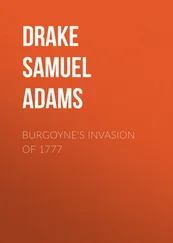Samuel Drake - Old Boston Taverns and Tavern Clubs
Здесь есть возможность читать онлайн «Samuel Drake - Old Boston Taverns and Tavern Clubs» — ознакомительный отрывок электронной книги совершенно бесплатно, а после прочтения отрывка купить полную версию. В некоторых случаях можно слушать аудио, скачать через торрент в формате fb2 и присутствует краткое содержание. Жанр: foreign_antique, foreign_prose, на английском языке. Описание произведения, (предисловие) а так же отзывы посетителей доступны на портале библиотеки ЛибКат.
- Название:Old Boston Taverns and Tavern Clubs
- Автор:
- Жанр:
- Год:неизвестен
- ISBN:нет данных
- Рейтинг книги:4 / 5. Голосов: 1
-
Избранное:Добавить в избранное
- Отзывы:
-
Ваша оценка:
- 80
- 1
- 2
- 3
- 4
- 5
Old Boston Taverns and Tavern Clubs: краткое содержание, описание и аннотация
Предлагаем к чтению аннотацию, описание, краткое содержание или предисловие (зависит от того, что написал сам автор книги «Old Boston Taverns and Tavern Clubs»). Если вы не нашли необходимую информацию о книге — напишите в комментариях, мы постараемся отыскать её.
Old Boston Taverns and Tavern Clubs — читать онлайн ознакомительный отрывок
Ниже представлен текст книги, разбитый по страницам. Система сохранения места последней прочитанной страницы, позволяет с удобством читать онлайн бесплатно книгу «Old Boston Taverns and Tavern Clubs», без необходимости каждый раз заново искать на чём Вы остановились. Поставьте закладку, и сможете в любой момент перейти на страницу, на которой закончили чтение.
Интервал:
Закладка:
Hudson’s house is said to have stood on the ground now occupied by the New England Bank, which, if true, would make this the most noted of tavern stands in all New England, or rather in all the colonies, as the same site afterward became known as the Bunch of Grapes. We shall have much occasion to notice it under that title. In Hudson’s time the appearance of things about this locality was very different from what is seen to-day. All the earlier topographical features have been obliterated. Then the tide flowed nearly up to the tavern door, so making the spot a landmark of the ancient shore line as the first settlers had found it. Even so simple a statement as this will serve to show us how difficult is the task of fixing, with approximate accuracy, residences or sites on the water front, going as far back as the original occupants of the soil.
Next in order of time comes the house called the King’s Arms. This celebrated inn stood at the head of the dock, in what is now Dock Square. Hugh Gunnison, victualler, kept a “cooke’s shop” in his dwelling there some time before 1642, as he was then allowed to sell beer. The next year he humbly prayed the court for leave “to draw the wyne which was spent in his house,” in the room of having his customers get it elsewhere, and then come into his place the worse for liquor, – a proceeding which he justly thought unfair as well as unprofitable dealing. He asks this favor in order that “God be not dishonored nor his people grieved.”
We know that Gunnison was favored with the custom of the General Court, because we find that body voting to defray the expenses incurred for being entertained in his house “out of ye custom of wines or ye wampum of ye Narragansetts.”
Gunnison’s house presently took the not always popular name of the King’s Arms , which it seems to have kept until the general overturning of thrones in the Old Country moved the Puritan rulers to order the taking down of the King’s arms, and setting up of the State’s in their stead; for, until the restoration of the Stuarts, the tavern is the same, we think, known as the State’s Arms. It then loyally resumed its old insignia again. Such little incidents show us how taverns frequently denote the fluctuation of popular opinion.
As Gunnison’s bill of fare has not come down to us, we are at a loss to know just how the colonial fathers fared at his hospitable board; but so long as the ‘treat’ was had at the public expense we cannot doubt that the dinners were quite as good as the larder afforded, or that full justice was done to the contents of mine host’s cellar by those worthy legislators and lawgivers.
When Hugh Gunnison sold out the King’s Arms to Henry Shrimpton and others, in 1651, for £600 sterling, the rooms in his house all bore some distinguishing name or title. For instance, one chamber was called the “Exchange.” We have sometimes wondered whether it was so named in consequence of its use by merchants of the town as a regular place of meeting. The chamber referred to was furnished with “one half-headed bedstead with blew pillars.” There was also a “Court Chamber,” which, doubtless, was the one assigned to the General Court when dining at Gunnison’s. Still other rooms went by such names as the “London” and “Star.” The hall contained three small rooms, or stalls, with a bar convenient to it. This room was for public use, but the apartments upstairs were for the “quality” alone, or for those who paid for the privilege of being private. All remember how, in “She Stoops to Conquer,” Miss Hardcastle is made to say: “Attend the Lion, there! – Pipes and tobacco for the Angel! – The Lamb has been outrageous this half hour!”
The Castle Tavernwas another house of public resort, kept by William Hudson, Jr., at what is now the upper corner of Elm Street and Dock Square. Just at what time this noted tavern came into being is a matter extremely difficult to be determined; but, as we find a colonial order billeting soldiers in it in 1656, we conclude it to have been a public inn at that early day. At this time Hudson is styled lieutenant. If Whitman’s records of the Artillery Company be taken as correct, the younger Hudson had seen service in the wars. With “divers other of our best military men,” he had crossed the ocean to take service in the Parliamentary forces, in which he held the rank of ensign, returning home to New England, after an absence of two years, to find his wife publicly accused of faithlessness to her marriage vows.
The presence of these old inns at the head of the town dock naturally points to that locality as the business centre, and it continued to hold that relation to the commerce of Boston until, by the building of wharves and piers, ships were enabled to come up to them for the purpose of unloading. Before that time their cargoes were landed in boats and lighters. Far back, in the beginning of things, when everything had to be transported by water to and from the neighboring settlements, this was naturally the busiest place in Boston. In time Dock Square became, as its name indicates, a sort of delta for the confluent lanes running down to the dock below it.
Here, for a time, was centred all the movement to and from the shipping, and, we may add, about all the commerce of the infant settlement. Naturally the vicinity was most convenient for exposing for sale all sorts of merchandise as it was landed, which fact soon led to the establishment of a corn market on one side of the dock and a fish market on the other side.
The Royal Exchangestood on the site of the Merchants’ Bank, in State Street. In this high-sounding name we find a sure sign that the town had outgrown its old traditions and was making progress toward more citified ways. As time wore on a town-house had been built in the market-place. Its ground floor was purposely left open for the citizens to walk about, discuss the news, or bargain in. In the popular phrase, they were said to meet “on ’change,” and thereafter this place of meeting was known as the Exchange, which name the tavern and lane soon took to themselves as a natural right.
A glance at the locality in question shows the choice to have been made with a shrewd eye to the future. For example: the house fronted upon the town market-place, where, on stated days, fairs or markets for the sale of country products were held. On one side the tavern was flanked by the well-trodden lane which led to the town dock. From daily chaffering in a small way, those who wished to buy or sell came to meet here regularly. It also became the place for popular gatherings, – on such occasions of ceremony as the publishing of proclamations, mustering of troops, or punishment of criminals, – all of which vindicates its title to be called the heart of the little commonwealth.
Indeed, on this spot the pulse of its daily life beat with ever-increasing vigor. Hither came the country people, with their donkeys and panniers. Here in the open air they set up their little booths to tempt the town’s folk with the display of fresh country butter, cheese and eggs, fruits or vegetables. Here came the citizen, with his basket on his arm, exchanging his stock of news or opinions as he bargained for his dinner, and so caught the drift of popular sentiment beyond his own chimney-corner.
To loiter a little longer at the sign of the Royal Exchange , which, by all accounts, always drew the best custom of the town, we find that, as long ago as Luke Vardy’s time, it was a favorite resort of the Masonic fraternity, Vardy being a brother of the order. According to a poetic squib of the time, —
“’Twas he who oft dispelled their sadness,
And filled the breth’ren’s hearts with gladness.”
Интервал:
Закладка:
Похожие книги на «Old Boston Taverns and Tavern Clubs»
Представляем Вашему вниманию похожие книги на «Old Boston Taverns and Tavern Clubs» списком для выбора. Мы отобрали схожую по названию и смыслу литературу в надежде предоставить читателям больше вариантов отыскать новые, интересные, ещё непрочитанные произведения.
Обсуждение, отзывы о книге «Old Boston Taverns and Tavern Clubs» и просто собственные мнения читателей. Оставьте ваши комментарии, напишите, что Вы думаете о произведении, его смысле или главных героях. Укажите что конкретно понравилось, а что нет, и почему Вы так считаете.












